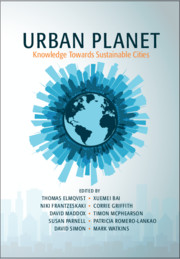Urban Planet
Global urbanization promises better services, stronger economies, and more connections; it also carries risks and unforeseeable consequences. To deepen our understanding of this complex process and its importance for global sustainability, we need to build interdisciplinary knowledge around a systems approach.
Urban Planet takes an integrative look at our urban environment, bringing together scholars from a diverse range of disciplines: from sociology and political science to evolutionary biology, geography, economics, and engineering. It includes the perspectives of often neglected voices: architects, journalists, artists, and activists. The book provides a much needed cross-scale perspective, connecting challenges and solutions on a local scale with drivers and policy frameworks on a regional and global scale. The authors argue that to overcome the major challenges we are facing, we must embark on a large-scale reinvention of how we live together, grounded in inclusiveness and sustainability. This title is also available Open Access from www.cambridge.org/core.
Thomas Elmqvist is a Professor in Natural Resource Management at Stockholm Resilience Centre, Stockholm University, Sweden.
Xuemei Bai is a Professor of Urban Environment and Human Ecology at Fenner School of Environment and Society, Australian National University, Australia.
Niki Frantzeskaki is Associate Professor on Sustainability Transitions Governance at the Dutch Research Institute for Transitions (DRIFT) at Erasmus University Rotterdam, the Netherlands.
Corrie Griffith is Program Manager of the Global Consortium for Sustainability Outcomes at Arizona State University, AZ, USA.
David Maddox is the founder and Executive Director of The Nature of Cities, a transdisciplinary essay site with more than 600 writers from around the world, from scientists to civil society, designers to artists.
Timon McPhearson is Associate Professor of Urban Ecology and Director of the Urban Systems Lab at The New School, New York, NY, USA, and a Research Fellow at the Cary Institute of Ecosystem Studies and Stockholm Resilience Centre, Sweden.
Susan Parnell is Professor of Human Geography , University of Bristol and Emeritus Professor at the African Centre for Cities at the University of Cape Town.
Patricia Romero-Lankao is Senior Research Scientist at the US National Center for Atmospheric Research based in Colorado, where she is currently leading the “Urban Futures” initiative.
David Simon is Director of Mistra Urban Futures at Chalmers University of Technology, Gothenburg, Sweden, and Professor of Development Geography at Royal Holloway, University of London, United Kingdom.
Mark Watkins is Program Manager for the Central Arizona-Phoenix Long-Term Ecological Research Program (CAP LTER), part of the US LTER network.



